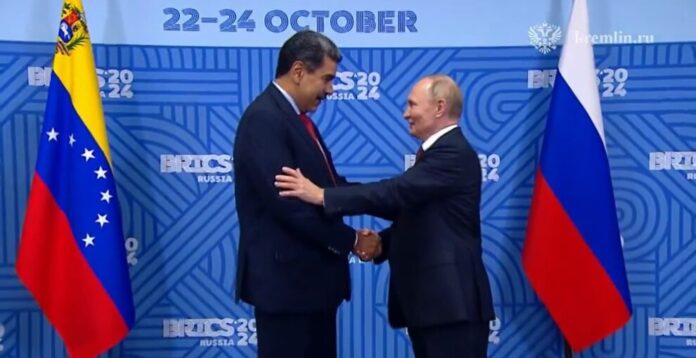Venezuela has taken a significant step to strengthen its alliance with Russia by signing crucial agreements during a recent high-profile meeting in Caracas. The discussions, led by Russian Deputy Prime Minister Dmitry Chernyshenko and Venezuelan Vice President Delcy Rodriguez, resulted in agreements focusing on intelligence-sharing, counter-espionage, and enhanced cooperation in energy sectors. Russia has been one of Venezuela’s most reliable allies in recent years, supporting President Nicolas Maduro’s government and its decisions.
These new agreements go beyond politics. Russia expressed its willingness to supply Venezuela’s armed forces with “the most sophisticated weapons and military equipment.” Chernyshenko’s statement emphasized Russia’s commitment to Venezuela’s defense and stability, promising access to advanced defense tools that are expected to boost the nation’s military strength. Both countries will also cooperate in intelligence work, with shared strategies in counter-espionage to strengthen their internal security and protect their interests from foreign threats. The use of drones and advanced technology in petroleum exploration were also part of the agreed-upon strategies, showing that the alliance spans beyond military support to include vital technological and resource-sharing initiatives.
Political Backing and the Disputed Election Results
In recent times, Russia has become a crucial supporter of President Nicolas Maduro, even as international opinions differ. Venezuela’s most recent election, held on July 28, led to Maduro claiming victory for a third consecutive term. However, opposition figures and their international allies, including the United States and several Latin American nations, dispute these results. They support opposition candidate Edmundo Gonzalez Urrutia, who they argue legitimately won the election based on detailed reports released by the opposition.
Unlike these international critics, Russia has recognized Maduro as the rightful leader of Venezuela, offering a strong endorsement for his government. Venezuelan authorities, known to be aligned with Maduro, have not yet disclosed the official breakdown of the votes, further intensifying the dispute around the election’s transparency and fairness. These opposing views have added to the existing political tension within Venezuela, highlighting the contrasting international responses and the deepening division among nations regarding Venezuela’s leadership.
Venezuela and Russia’s alignment on political matters is rooted in shared ideologies and a long history of alliance. Their connection dates back to the era of Hugo Chavez, Venezuela’s iconic socialist leader, who held office from 1999 until his passing in 2013. Under Chavez, Venezuela adopted a firm anti-U.S. stance, welcoming Russian support and seeking close ties with other countries willing to counterbalance the United States’ influence in Latin America. This alliance remained strong after Chavez’s death, as Maduro, his chosen successor, continued the legacy by aligning closely with Russia, especially in international matters, such as the support for Russia’s military operations in Ukraine.
Oil, Resources, and Economic Challenges
Venezuela’s vast oil reserves have been a major focus of its economy and political policies, but it has also led to challenges. The country holds the world’s largest proven oil reserves, once producing over three million barrels of oil daily, providing Venezuela with a steady flow of foreign currency. However, years of mismanagement, combined with strict international sanctions, have significantly weakened Venezuela’s oil industry. Production has dropped to approximately one million barrels per day—a drastic decrease that has affected Venezuela’s economy, which heavily relies on oil revenues.
As part of the recent agreements, Russia has committed to assisting Venezuela in advancing its petroleum exploration capabilities. This collaboration is likely intended to counterbalance the effects of international sanctions and revive Venezuela’s oil industry. Both countries will utilize advanced Russian technology to enhance petroleum exploration, a move aimed at increasing productivity despite external economic pressures. Russia’s technological support is crucial for Venezuela as it seeks to stabilize its oil output and secure a steady revenue source.
The strengthening of Russia and Venezuela’s alliance highlights their determination to work together across various domains, focusing on military, intelligence, and energy cooperation. These agreements signify a notable shift as Venezuela looks to its powerful ally to maintain stability in a challenging political and economic environment.


